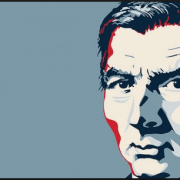Economics Aims At Harmony, Government At Disharmony.
Before 2020, government, and especially campaigning to be part of it, as we were forced to endure it, routinely embraced massive mud- and blame-slinging as standard operating procedure. The “other guys” were always unprincipled black hats blocking self-defined white hats’ solutions. Then COVID-19, BLM, rioting, efforts to defund the police, etc. combined with the 2020 election piled onto that already onerous approach, attached only by the thinnest thread to promises that the winners will then bring us more into harmony. We can only hope that this year’s political and electoral torture of citizens will teach us that the government we suffer from does not expand harmony, but is rather the greatest cause of our disharmony.
The reason is that continually leveraging government power into ever-more areas where people’s views differ dramatically increases how frequently some people’s preferences are forced on others. That guarantees acrimony, not harmony. And the COVID-19 crisis, with a major recession triggered by what amounts to government prohibition of production and exchange in vast areas of the economy, has only supercharged the disharmony.
To understand how our disharmony comes from those who constantly promise to unite us, we could learn much from studying what Frederic Bastiat, among history’s ablest defenders of freedom, had to teach in his “Economic Harmonies.”
All men’s impulses, when motivated by legitimate self-interest, fall into a harmonious social pattern … the practical solution … is simply not to thwart those interests or to try to redirect them.
Coercion … [has] never yet done anything … except to eliminate liberty.
If you entrust men with arbitrary power, you must first prove that … their minds will be exempt from error, their hands from greed, and their hearts from covetousness.
[But] It is not necessary to force into harmony things that are inherently harmonious.
Let men labor, exchange, learn, band together, act, and react upon one another … there can result from their free and intelligent activity only order, harmony and progress.
The question is whether or not we have liberty … not profoundly disrupted by the contrary act of institutions of human origin.
Social order, freed from its abuses and the obstacles that have been put in its way … [is] the most admirable, the most complete, the most lasting, the most universal, and the most equitable of all associations.
The laws of Providence are harmonious … only when they operate under conditions of freedom …Therefore when we perceive something inharmonious in the world, it cannot fail to correspond to some lack of freedom or justice.
The state always acts through the instrumentality of force … What are the things that men have the right to impose on one another by force? … I have no right to force anyone to be religious, charitable, well educated, or industrious; but I have the right to force him to be just: this is a case of legitimate self-defense.
If, therefore, the use of force by the individual is justified solely on grounds of legitimate self-defense, we need only recognize that government action always takes the form of force to conclude that by its very nature it can be exerted solely for the maintenance of order, security, and justice. All government action beyond this limit is an encroachment upon the individual’s conscience, intelligence, and industry—in a word, upon human liberty.
Accordingly, we must [turn] … to the task of freeing the whole domain of private activity from the encroachments of government.
Restrict the public police force to its one and only rightful function … from what source could come all our present ills … which teach the people to look to the government for everything … to the ever increasing and unnatural meddling of politics into all things.
Many causes of disturbances, friction, disaffection, envy, and disorder would no longer exist … it reduces evil to the smaller and smaller area left open to it by the ignorance and perversity of our human frailty, which it is the function of harmony to prevent or chastise.
Bastiat’s “Economic Harmonies” aptly identified individual rights and freedom as central to social harmony and progress. But such freedom required government “exerted solely for the maintenance of order, security, and justice.” Every expansion beyond that narrow bound, often triggered by crises such as our current ones, where government expands its role as dispenser of goodies and garnishments, inherently destroys the harmony that self-ownership and voluntary arrangements could provide. The acrimony of coercion displaces the harmony of freedom.
And the solution, now as always, is not to expand coercion to match growing wish lists of what people want government to do for them at others’ expense, but to contract it as quickly and completely as possible.
Gary M. Galles is a professor of economics at Pepperdine University. Bastiat drawing: LefontQ via issuesinsights.com (creative commons license).




